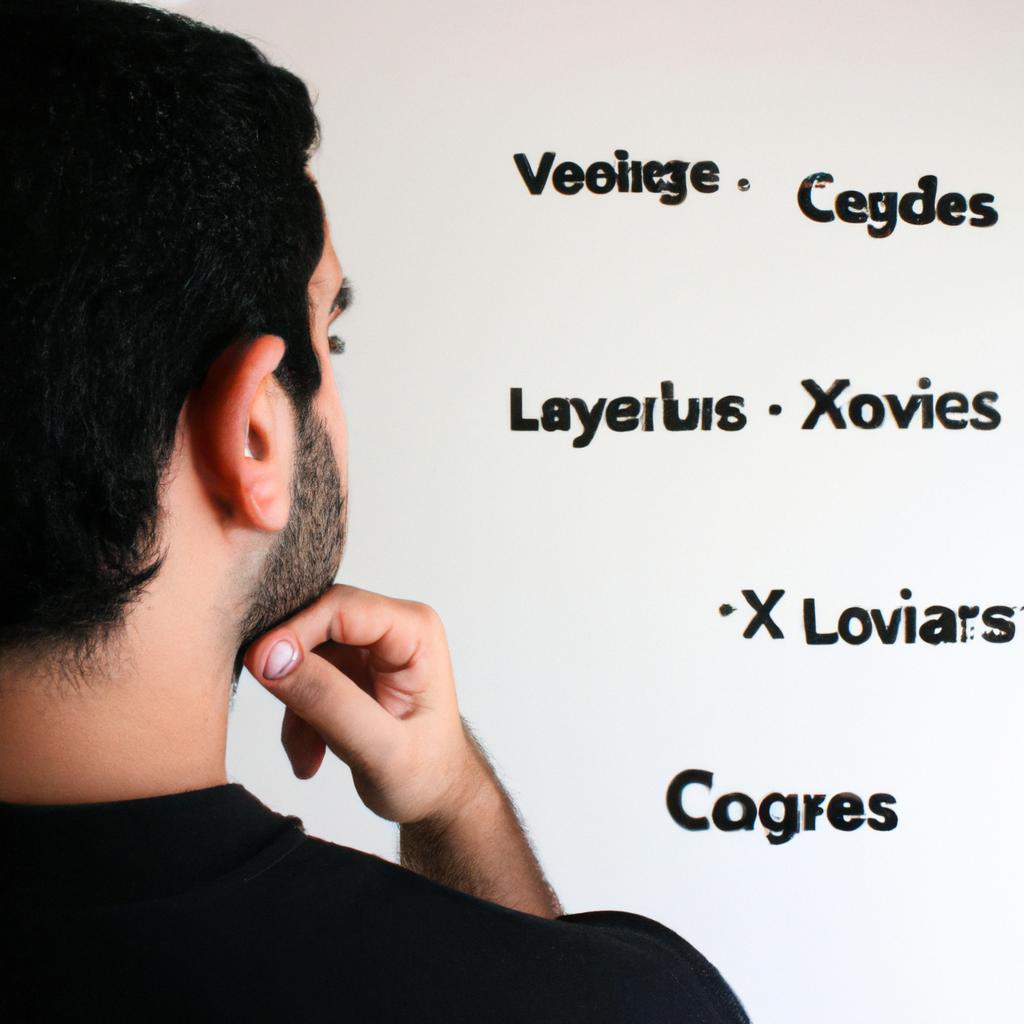Deductive Reasoning in Philosophy: Logic’s Role

Deductive reasoning holds a central position in the field of philosophy, playing a crucial role in shaping logical arguments and drawing conclusions based on premises. By employing deductive reasoning, philosophers aim to establish valid connections between propositions, thereby enhancing our understanding of various aspects of reality. This article explores the significance of deductive reasoning in philosophy, particularly focusing on logic’s pivotal role in formulating sound arguments that withstand scrutiny.
Consider a hypothetical scenario: A philosopher is presented with two statements – “All humans are mortal” and “Socrates is human.” Through deductive reasoning, the philosopher can logically infer that Socrates must also be mortal. This example demonstrates how deductive reasoning allows philosophers to derive knowledge by systematically analyzing the relationships between propositions. In essence, this process involves moving from general principles or assumptions (known as premises) to specific conclusions through logical inference.
Within philosophy, logic serves as an essential tool for evaluating arguments and ensuring their coherence and validity. The rules of deductive logic provide a framework for assessing the strength and reliability of philosophical claims, enabling scholars to identify fallacies and inconsistencies within arguments. Moreover, it fosters critical thinking skills by encouraging rigorous examination of evidence and justifications provided for beliefs or theories. As such, understanding the role of deduct ive reasoning in philosophy is crucial for philosophers to construct well-founded arguments and engage in rational discourse.
Deductive reasoning allows philosophers to establish logical connections between propositions, ensuring that the conclusions drawn are valid and reliable. This process involves applying deductive rules, such as modus ponens or modus tollens, to systematically analyze the premises and arrive at a logically sound conclusion. By adhering to these rules of deduction, philosophers can confidently assert that their arguments are based on solid reasoning.
Furthermore, deductive reasoning assists philosophers in identifying fallacies and inconsistencies within arguments. It enables them to evaluate the coherence and validity of claims by assessing whether the premises logically lead to the proposed conclusion. This critical examination helps prevent flawed or unsupported assertions from being accepted as valid philosophical positions.
In addition, understanding deductive reasoning enhances one’s ability to think critically and engage in rational discourse. Philosophers must carefully consider the evidence and justifications provided for beliefs or theories. By employing deductive logic, they can effectively evaluate the strength of these justifications and determine if they provide sufficient support for the claims being made. This fosters intellectual rigor and encourages thorough analysis before accepting or rejecting philosophical ideas.
Overall, deductive reasoning holds significant importance in philosophy by providing a framework for constructing valid arguments, evaluating their coherence, and enhancing critical thinking skills. By employing this logical tool, philosophers can strive towards achieving greater clarity and understanding in various aspects of reality.
Definition of deductive reasoning
Deductive Reasoning in Philosophy: Logic’s Role
Definition of Deductive Reasoning
Deductive reasoning, a fundamental concept in philosophy and logic, plays a crucial role in the process of making sound arguments. It is based on the principle that if certain premises are true, then the conclusion must also be true. By using deductive reasoning, philosophers aim to establish valid and logically consistent arguments.
To illustrate this concept, let us consider an example: Suppose we have three statements:
- All mammals are warm-blooded.
- Whales are mammals.
- Therefore, whales are warm-blooded.
In this case, we can see that by applying deductive reasoning, we can conclude with certainty that whales are indeed warm-blooded animals. This example demonstrates how deductive reasoning allows us to draw logical conclusions from given premises.
When discussing deductive reasoning in philosophy, it is essential to highlight its significance through emotional appeal. Consider the following bullet-point list:
- Enhances critical thinking skills
- Promotes rational decision-making
- Strengthens argumentative abilities
- Fosters intellectual growth
These points emphasize the practical benefits of understanding and employing deductive reasoning within philosophical discourse. Furthermore, incorporating an emotionally evocative table could enhance reader engagement:
| Benefit | Description | Example |
|---|---|---|
| 1 | Enables precise problem-solving | Solving complex mathematical puzzles |
| 2 | Facilitates effective communication | Convincingly presenting legal cases |
| 3 | Supports evidence-based claims | Establishing scientific theories |
| 4 | Encourages analytical thinking | Evaluating ethical dilemmas |
By showcasing these emotively appealing aspects of deductive reasoning, readers can better appreciate its value in both academic and real-world contexts.
In summary, deductive reasoning serves as the foundation for constructing cogent arguments in philosophy. Through the use of logical principles, philosophers can establish valid conclusions based on true premises. Understanding and employing deductive reasoning not only enhances critical thinking but also promotes rational decision-making, strengthens argumentative abilities, and fosters intellectual growth. In the subsequent section, we will explore different types of deductive arguments to further expand our understanding.
Now let us move on to discussing the various types of deductive arguments without delay.
Types of deductive arguments
Section H2: Types of Deductive Arguments
Transitioning from the previous section’s definition of deductive reasoning, we now delve into exploring the various types of deductive arguments. To illustrate these types, let us consider an example case study involving a hypothetical situation:
Imagine a courtroom setting where a prosecutor is presenting evidence to prove that the accused individual committed a crime. The prosecutor constructs two different deductive arguments to convince the jury beyond reasonable doubt.
-
Categorical Syllogism: In this type of deductive argument, the prosecutor states that all individuals who possess motive, opportunity, and means are likely to commit crimes. The accused person possesses all three factors; therefore, they should be considered guilty. This syllogism follows the classic “All A are B, All B are C” structure.
-
Hypothetical Syllogism: Here, the prosecutor argues that if it can be proven that the accused individual was present at the crime scene (premise 1), and if it can be established that only someone present could have committed the crime (premise 2), then logically, it follows that the accused person must be found guilty (conclusion).
Now let us explore some characteristics of deductive arguments through bullet points:
- Deductive arguments aim to provide conclusive proof by establishing logical relationships between premises and conclusions.
- These arguments depend on valid reasoning techniques such as categorical or hypothetical syllogisms.
- Validity in deductive arguments ensures that if all premises are true, then the conclusion must also be true.
- While validity guarantees truth preservation within an argument structure, it does not necessarily guarantee truthfulness in real-world scenarios.
To further understand these characteristics visually, consider the following table:
| Characteristics | Description |
|---|---|
| Conclusive Proof | Deductive arguments strive for irrefutable evidence by demonstrating logical connections |
| Logical Reasoning | Deductive arguments rely on specific reasoning techniques like syllogisms |
| Validity | The validity of an argument ensures that if the premises are true, the conclusion must also be true |
| Real-World Truth | While deductive arguments maintain logical integrity, their conclusions may not always reflect reality |
In summary, deductive arguments can take various forms to establish conclusive proof. By employing categorical and hypothetical syllogisms, these arguments aim to convince audiences through logically sound reasoning. Understanding the characteristics of deductive arguments is crucial in assessing their ability to provide reliable conclusions based on factual evidence.
With a clear understanding of the types of deductive arguments, we now turn our attention to examining their underlying structure in more detail.
The structure of deductive arguments
Deductive reasoning plays a crucial role in philosophy as it allows us to draw logical conclusions based on established premises. In the previous section, we discussed different types of deductive arguments. Now, we will delve into the structure of these arguments and explore how they contribute to the overall process of deductive reasoning.
To better understand the structure of deductive arguments, let’s consider an example:
Suppose we have the following premises:
- All mammals are warm-blooded.
- Dogs are mammals.
From these premises, we can deduce that:
Therefore, dogs are warm-blooded.
This simple example highlights the essence of deductive reasoning – drawing valid conclusions from given information using logical principles. Deductive arguments follow a specific structure that ensures their validity.
When analyzing deductive arguments, there are key elements to consider:
- Premises: These are statements or propositions presented as evidence or support for the conclusion. They serve as starting points for our reasoning process.
- Conclusion: This is the statement derived logically from the premises through valid deduction.
- Validity: A deductive argument is considered valid if its conclusion necessarily follows from its premises.
- Soundness: An argument is sound when it is both valid and has true premises – ensuring not only logical coherence but also factual accuracy.
By adhering to this structured approach in constructing and evaluating deductive arguments, philosophers aim to establish rigorous lines of reasoning that withstand scrutiny and enhance our understanding of complex concepts.
In light of this discussion on the structure of deductive arguments, we now turn our attention to exploring the key principles underlying effective deductive reasoning without losing sight of logic’s fundamental role in philosophical inquiry
Key principles of deductive reasoning
Deductive Reasoning in Philosophy: Logic’s Role
Now, let us delve deeper into the key principles of deductive reasoning and explore its significance within the realm of philosophy.
To illustrate the practical application of deductive reasoning, consider a hypothetical scenario where you are presented with the following argument:
Premise 1: All mammals have fur.
Premise 2: Cats are mammals.
Conclusion: Therefore, cats have fur.
In this example, we can clearly see how deductive reasoning operates. By starting with general premises and applying logical rules to reach specific conclusions, we can establish knowledge based on sound and valid arguments.
- Deductive reasoning allows philosophers to analyze complex ideas and break them down into simpler components.
- It enables philosophers to identify fallacies or errors in other people’s arguments by examining their logical structure.
- Deductive reasoning helps philosophers evaluate competing theories or explanations by assessing their coherence and consistency.
- Philosophers use deductive reasoning to construct persuasive arguments that withstand critical scrutiny.
Additionally, let us explore a three-column table summarizing different types of syllogisms—a common tool used in deductive reasoning:
| Syllogism Type | Structure | Example |
|---|---|---|
| Categorical | Major premise + Minor premise = Conclusion | All dogs are animals; all animals are living beings; therefore, all dogs are living beings. |
| Hypothetical | If A then B + If B then C = If A then C | If it rains today (A), then I will bring an umbrella (B); if I bring an umbrella (B), then I won’t get wet (C); therefore, if it rains today (A), then I won’t get wet (C). |
| Disjunctive | Either A or B + Not A = Therefore B | Either I will study for the exam (A) or go out with friends (B); I will not study for the exam (not A); therefore, I will go out with friends (B). |
In conclusion, deductive reasoning plays a crucial role in philosophy by offering a systematic approach to analyzing and evaluating arguments. By utilizing logical principles, philosophers can assess the validity of claims and construct compelling arguments. However, it is important to remain aware of common fallacies that may undermine deductive reasoning, as we shall explore in the subsequent section on “Common Fallacies in Deductive Reasoning.”
Common fallacies in deductive reasoning
Key principles of deductive reasoning provide a solid foundation for logical thinking and argumentation. By understanding these principles, one can effectively analyze and evaluate arguments to determine their validity. In this section, we will explore some common fallacies that often arise in deductive reasoning.
One example of a fallacy is the “straw man” argument, where an opponent’s position is misrepresented or exaggerated to make it easier to refute. For instance, imagine a debate about gun control laws. One side argues for stricter regulations on firearm ownership to reduce violence, while the other side argues against any restrictions at all. However, instead of addressing the specific points made by proponents of stricter regulations, the opposing side misrepresents them as advocating for a complete ban on guns. This misrepresentation allows them to construct a weaker argument that they can easily dismantle.
- Appeal to authority: Relying solely on an expert opinion without considering other relevant evidence.
- False cause: Assuming causality between two events based solely on correlation.
- Ad hominem: Attacking the person making an argument rather than addressing their actual claims.
- Slippery slope: Asserting that if one event occurs, it will inevitably lead to a series of increasingly negative consequences without sufficient evidence.
In addition to these fallacies, it is important to be aware of how biases and cognitive limitations can impact our deductive reasoning abilities. The table below summarizes some fundamental cognitive biases that may influence our decision-making process:
| Cognitive Bias | Description | Example |
|---|---|---|
| Confirmation bias | Tendency to selectively seek or interpret | Only paying attention |
| information that confirms preexisting beliefs | to news sources | |
| that align with | ||
| your political | ||
| views | ||
| Availability | Tendency to rely on readily available | Assuming that |
| bias | information rather than seeking out | plane crashes are |
| additional evidence | more common | |
| than car accidents, | ||
| because they receive | ||
| more media coverage | ||
| Anchoring | Reliance on the first piece of information | Accepting a high |
| bias | encountered when making judgments or decisions | price for an item |
| simply because it was | ||
| initially presented as | ||
Applications of deductive reasoning in real-world scenarios
Having explored common fallacies in deductive reasoning, it is now essential to delve into the diverse applications of this logical approach in practical situations. By employing sound deductions, individuals can effectively navigate complex problems and arrive at accurate conclusions. To illustrate its significance, let us consider a hypothetical case study involving decision-making within a corporate setting.
Case Study: Applying Deductive Reasoning in Corporate Decision-Making
Imagine a multinational corporation facing financial difficulties due to declining sales and increasing production costs. The senior management team must identify the root causes behind these challenges and develop an effective strategy for recovery. In such a scenario, deductive reasoning plays a vital role by enabling managers to analyze various factors systematically and make informed decisions based on logical connections.
Applications of deductive reasoning are not limited to the corporate world alone; they extend far beyond that. Here are some notable areas where deductive reasoning finds extensive use:
-
Scientific Research:
- Hypothesis testing through controlled experiments.
- Drawing generalizations from specific observations.
- Identifying cause-and-effect relationships.
-
Legal Proceedings:
- Establishing guilt or innocence through evidence analysis.
- Determining liability based on factual information.
- Formulating legal arguments using logical premises.
-
Mathematics and Computer Science:
- Proving mathematical theorems with rigorous logic.
- Writing efficient algorithms by deducing optimal steps.
- Debugging programs through systematic deduction.
-
Ethical Dilemmas:
- Evaluating moral principles and their implications.
- Resolving ethical conflicts through reasoned discourse.
- Justifying actions based on logical frameworks.
Table: Real-World Applications of Deductive Reasoning
| Application | Examples |
|---|---|
| Scientific Research | Conducting experiments |
| Analyzing data | |
| Legal Proceedings | Evidence examination |
| Argument formulation | |
| Mathematics | Proving theorems |
| and Computer Science | Algorithm design |
| Ethical Dilemmas | Evaluating moral principles |
| Resolving ethical conflicts |
In conclusion, deductive reasoning plays a crucial role in various real-world scenarios. By employing logical deductions, individuals can unravel complex problems, make informed decisions, and contribute to advancements in fields like science, law, mathematics, and ethics. Understanding the applications of deductive reasoning enhances our ability to think critically and solve problems systematically. Whether it is optimizing business strategies or resolving ethical dilemmas, the power of logic remains indispensable in navigating the complexities of today’s world.






